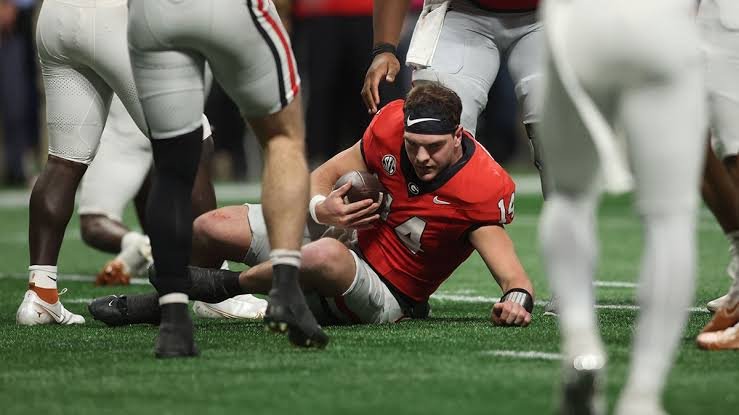BREAKING: Gunner Stockton’s Helmet Knocked Off in Overtime Thriller—No Targeting Called as Georgia Clinches Win
In an intense overtime battle, Georgia quarterback Gunner Stockton found himself at the center of a controversial moment when his helmet was forcefully knocked off during a critical play. Despite the violent nature of the hit, no targeting penalty was called, leaving fans and analysts questioning the officiating. The Bulldogs ultimately emerged victorious, securing a dramatic win, but the incident has sparked widespread debate about player safety and the consistency of refereeing decisions.
A Hard-Hitting Overtime Clash
The game had already been a rollercoaster, with both teams battling fiercely for supremacy. Georgia and their opponent exchanged blows throughout regulation, with neither side willing to back down. As the clock ran out in the fourth quarter, the score remained deadlocked, sending the contest into a high-stakes overtime.
Stockton, who had played a crucial role in leading Georgia’s offense, was under immense pressure to deliver. On a pivotal play, he scrambled out of the pocket, searching for an opening to either throw or gain critical yardage with his legs. However, just as he neared the first-down marker, a defender delivered a massive hit, sending Stockton’s helmet flying off.
The impact was severe enough to momentarily stun the quarterback, yet no flag was thrown for targeting. The stadium erupted with mixed reactions—Georgia fans celebrated Stockton’s toughness, while the opposing supporters were stunned that no penalty had been called. The Bulldogs retained possession and eventually closed out the game with a victory, but the incident left many questioning the officiating standards.
Debate Over the No-Call
The hit on Stockton immediately became a focal point of discussion. Under NCAA rules, targeting is defined as a hit to the head or neck area of a defenseless player or leading with the crown of the helmet to initiate contact. Many viewers believed the play fit those criteria, and the fact that no penalty was assessed led to frustration among fans and analysts alike.
Social media platforms were flooded with reactions, with some arguing that the referees had missed an obvious call. Others countered that the hit, while brutal, was legal and part of the game’s physical nature. The lack of a review for targeting also fueled speculation about officiating inconsistencies in crucial moments.
Former players and analysts weighed in on the controversy. Some defended the referees, suggesting that Stockton was not in a “defenseless” position and that the hit, while forceful, was within the rules. Others, however, pointed to similar incidents in past games where targeting was called under seemingly less severe circumstances.
Georgia’s Resilience and Stockton’s Grit
Despite the brutal hit, Stockton displayed remarkable toughness. He quickly regained his composure, stayed in the game, and helped lead Georgia to a thrilling victory. His performance throughout the night showcased his poise under pressure and his ability to rise to the occasion when it mattered most.
Georgia’s offense had relied heavily on Stockton’s leadership, and he delivered when it counted. Whether making key throws or using his mobility to extend plays, he proved to be a crucial factor in the Bulldogs’ success. His resilience in the face of adversity only solidified his status as a rising star in college football.
Implications Moving Forward
While Georgia celebrated their hard-fought win, the no-call on the hit to Stockton is likely to remain a topic of discussion for days to come. The incident highlights the ongoing debate over targeting rules, officiating consistency, and player safety. It also raises questions about whether the NCAA should implement changes to review procedures in high-stakes moments like overtime.
For Stockton, the game served as both a test of his physical durability and mental toughness. If nothing else, he proved he can take a hit and keep leading his team. However, for the broader landscape of college football, the play serves as another example of why clear and consistent officiating remains a critical issue for the sport.
